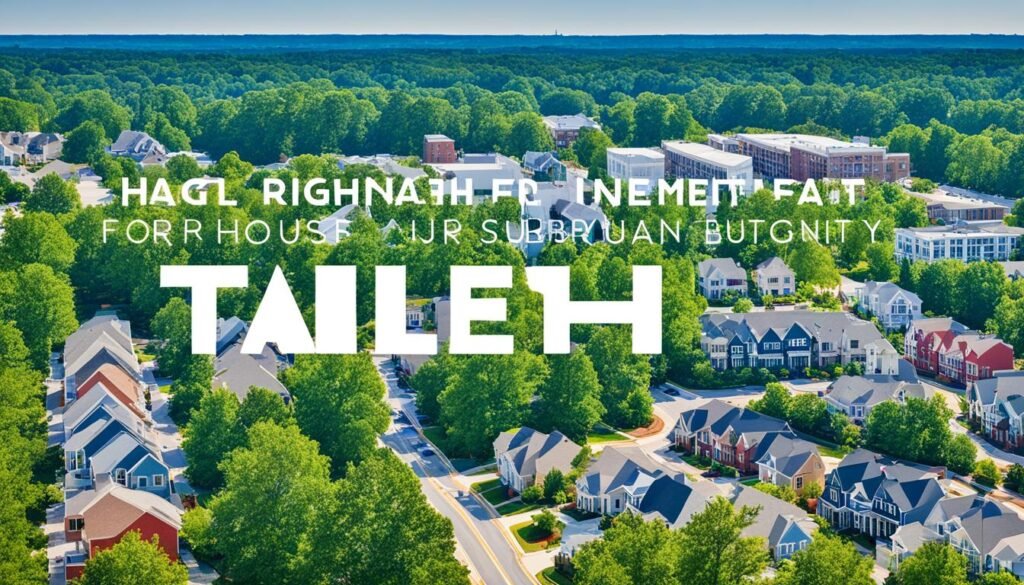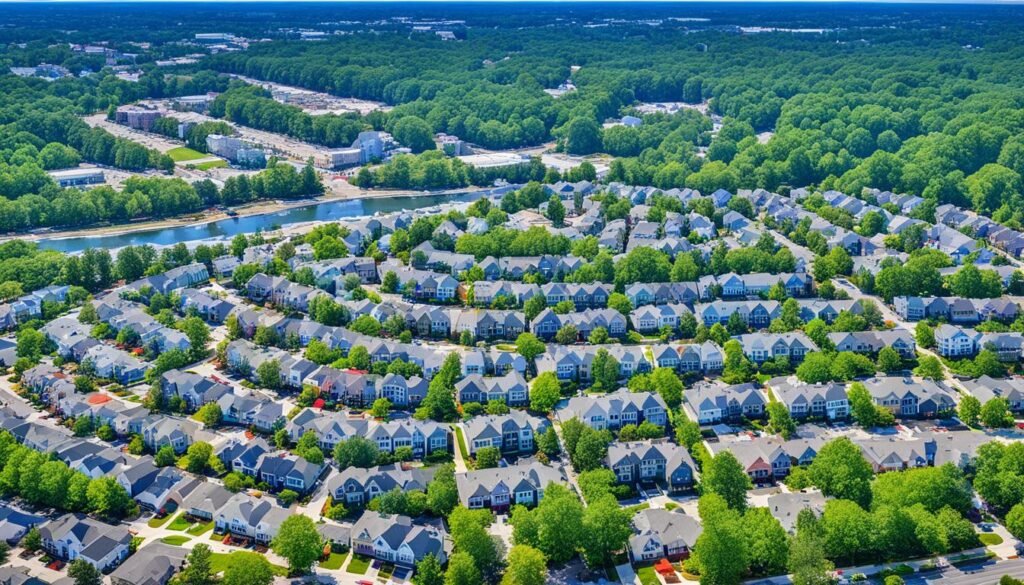Delving into the viability of real estate investment in Raleigh, it’s critical to discern whether Raleigh real estate market analysis testifies to a sound financial commitment. As the median selling price of homes in Raleigh hovers at $380,000 in February 2024, the bustling city beckons investors with its market vibrancy and swift sales, typically concluding within 22 days1. This introduction serves as the gateway to understanding, through multiple layers, why real estate investment in Raleigh might be one of the most astute decisions you make. From garnering insights on market growth to unraveling the tapestry of top neighborhoods, this article stands as an essential guide for investors evaluating the pivotal question: is Raleigh a good place to invest in real estate?
Key Takeaways
- Insight into Raleigh’s competitive selling price and market speed.
- Overview of why Raleigh holds promise as a strong investment hub.
- Details on top-performing neighborhoods for investment potential.
- Analysis of Raleigh’s economic and demographic influences on the real estate landscape.
- Tips for capitalizing on Raleigh’s thriving rental market.
By the end of this article, you’ll be equipped with reasons to invest in Raleigh real estate and actionable Raleigh real estate investment tips to navigate the market confidently.
Assessing Raleigh’s Real Estate Market Growth
Analyzing Raleigh real estate market trends unveils a narrative of robust growth, fueled by significant economic development and population increase. With Raleigh’s population growth consistently rising, there’s an undeniably strong impact on housing demand, which has been driving real estate performance across all sectors.
Raleigh’s Promising Population Trends
Indeed, Raleigh’s homeownership rate has historically hovered around 50%, a figure that’s notably lower than the national rate of 64%2. This statistic suggests a considerable rental demand in Raleigh, as more residents opt for tenancy over ownership. Reinforcing this insight, Raleigh’s apartment vacancy rates since 2012 have remained below both state and national averages2, suggesting consistent demand for rental properties amidst the city’s expansion.
The Strength of Raleigh’s Economy
The Raleigh economy serves as a powerful magnet to a skilled workforce. Industries spanning information technology to biotechnology anchor the city’s job market, attracting a diverse and professional demographic. This influx of talent bolsters rental demand, as new residents seek convenient, flexible housing options. Moreover, data indicates that Raleigh’s median home sales price is 17% higher than the national average2, reflecting the economy’s strength and desirability in living here.
Universities as a Catalyst for Rental Demand
Universities, including the esteemed Duke University and the University of North Carolina, act as catalysts for continued rental demand in Raleigh. Not only do they contribute to the city’s vibrancy and innovation landscape, but they also create a steady stream of young adults seeking housing. This is a vital consideration for investors eyeing the Raleigh market as a destination with sustained growth potential.
Perhaps most telling are the comparative figures regarding publicly-supported affordable housing in Raleigh. With less than 5% of the total housing supply designated as affordable, and districts like Central Planning including one-quarter of all assisted affordable housing units, contrasted with areas like Umstead Planning District housing less than 4% of these units2, the city’s strategic development areas become particularly apparent for investors.
| Raleigh Marker Indicators | Statistics | Implications |
|---|---|---|
| Median Home Sales Price | 17% Above National Average | Indicates a strong seller’s market and growing property values. |
| Raleigh Homeownership Rate | ~50% | Suggests a robust rental market with less competition from homebuyers. |
| Rental Demand | Low Apartment Vacancy Rates | Consistent demand from professionals and students. |
| Affordable Housing Units | 7,564 Units | Scarcity signifies investment opportunities in affordable housing. |
From the competitive 44-day average days on market until sale in Wake County2 to the Triangle MLS reported sales prices skyrocketing by up to 10% annually year-over-year2, these statistics anchor Raleigh as a sellers’ haven with a substantial projection for continued economic fortitude. Navigating through these trends, real estate investors can surmise the vast array of opportunities that Raleigh’s growth trajectory presents.
Top Neighborhoods for Real Estate Investment in Raleigh
Identifying the best Raleigh neighborhoods for investment is crucial for maximizing returns in the bustling Raleigh real estate market. Recent trends in Raleigh’s housing landscape have underscored specific areas that stand out for investment potential, driven by a mix of affordability, demand, and growth prospects. For instance, the sale-to-list price ratio in Raleigh holding steady at 99.1% indicates that properties in popular neighborhoods continue to sell near their asking price despite a 29.0% year-over-year increase in homes receiving price cuts1.

One of the top neighborhoods for real estate investment in Raleigh is Cameron Park, known for its historic charm and accessibility. Similarly, Historic Oakwood captivates investors with its picturesque streets lined with architectural gems. Mordecai’s appeal lies in its proximity to downtown and vibrant community spirit. Not to be overlooked, Cameron Village offers an enticing mix of residential options within walking distance to shopping and dining experiences.
Market dynamics such as a median selling price of $380,000 and properties spending an average of 22 days on the market prior to sale1 attract investors to areas like Brier Creek for its well-rounded amenities and Five Points for its blend of suburban feel and urban convenience. Meanwhile, Glenwood South is emerging as a profitable neighborhood in Raleigh, thanks to its trendy atmosphere and plethora of entertainment options.
These investment hotspots benefit from Raleigh’s overall market health, which showcases a 3.0% increase in average home value over the past year and forecasts suggesting up to a 2.4% increase in home values by early 20251. The rental market is equally enticing with single-family homes, the preferred choice for 43% of renters1, especially those drawn by Raleigh’s educational institutions and burgeoning professional opportunities.
When it comes to affordability, Raleigh is ranked by Kiplinger’s index as one of the top cities for housing affordability — a boon for investors looking to maximize their dollar. The continued upward trajectory of average home values also suggests a stable and potentially lucrative market1. Investors keen on exploring this avenue further should consider current real estate market analyses to make informed decisions.
To sum up, while Raleigh’s housing market may have experienced a slight 2.4% dip in home prices, the outlook remains positive with fast sale times, homes still fetching close to their listing prices, and a rental demand sustained by the student market and young professionals. Considering these factors alongside each neighborhood’s unique attributes solidifies Raleigh as a location ripe for real estate investment endeavors1.
Is Raleigh a Good Place to Invest in Real Estate?
Raleigh’s steady ascent in the real estate market charts a promising course for those considering real estate investment in Raleigh. The confluence of educational institutions, flourishing industries, and an appealing cost of living presents compelling reasons why invest in Raleigh real estate. So, is Raleigh primed for investors? The evidence paints a vivid picture of opportunity and growth.
Real Estate Market Trends Favoring Investors
The recent Raleigh real estate market analysis unveils a landscape ripe with potential. A robust rental market combined with appreciating property values signals a healthy environment for investment. Contributing to these trends are the city’s population growth and economic vitality, underpinned by a thriving tech scene and a stronghold of educational institutions. This momentum builds a case for the advantages of investing in Raleigh, not only for seasoned investors but also for those new to the realm of property investment.

Affordability and Accessibility in Raleigh’s Housing Market
In a comparative context, Raleigh’s real estate reveals an affordability factor that outshines many of its urban counterparts. This affordability, when juxtaposed with the potential for higher investment returns, offers a tantalizing advantage for those entering the Raleigh market. Low property taxes and investor-friendly laws further reduce barriers to entry, making the pathway to real estate investment in Raleigh both accessible and attractive. This financial accessibility is a cornerstone for why invest in Raleigh real estate, especially for those weighing the merits of launching into real estate endeavors.
The Dynamics of Raleigh’s Rental Market
Investing in rental properties in Raleigh provides an intriguing prospect, largely due to the unique characteristics of the city’s rental market. The median rent in Raleigh sits at $926, closely mirroring the national median, demonstrating a balanced demand and offering a steady income stream for investors2. Moreover, the strength of the rental market is further backed by low vacancy rates; as of 2015, Raleigh’s apartment vacancy rate was registered at 5.05%, which is notably below the state rate of 7.02% and the national average of 5.85%2. The significant portion of renter-occupied units, accounting for 47.9% of Raleigh’s housing, underlines the city’s rental demand compared to the national percentage of 36.1%2.
When dissecting rental market trends in Raleigh, one must consider the diversity and availability of properties. The city offers an array of rental options from single-family homes to multi-family units, appealing to various demographics including young professionals, families, and university students. This diversity is a key contributor to the rental market’s resilience. Despite the allure of robust median household incomes for homeowners in Raleigh at $81,512, which stands well above the national median of $53,889, the reality is that a substantial number of households, especially the approximately 51,500 renter households below 80% of the Area Median Income, are classified as cost-burdened, emphasizing the ongoing need for affordable rental properties2.
For investors eyeing rental property in Raleigh, it is crucial to recognize the advantages presented by the market, particularly the city’s robust employment sector and its university-driven rental demand. With median household income for renters at $36,559, slightly higher than the national median, and a consistent supply of housing reflected by a modest ownership cost at $1,424, just below the national average, Raleigh stands as a financially viable location for both renters and investors2. Furthermore, the niche for affordable housing is evident with less than 5% of the total housing supply being publicly-supported affordable units, presenting a gap for socially responsible investment opportunities. In conclusion, the state of Raleigh’s rental market offers both promising avenues for revenue generation and a chance to contribute to the community’s housing stability, affirming the city’s stature as a worthwhile real estate investment destination.
FAQ
Is Raleigh a good place to invest in real estate?
What factors contribute to Raleigh’s real estate market growth?
What are the top neighborhoods for real estate investment in Raleigh?
Why is Raleigh considered a good place to invest in real estate overall?
What are the dynamics of Raleigh’s rental market?
Source Links
- https://www.noradarealestate.com/blog/raleigh-nc-real-estate-market/
- https://cityofraleigh0drupal.blob.core.usgovcloudapi.net/drupal-prod/COR22/CPU07HousingBL.pdf
As a passionate, global-thinking Real Estate Investor I am constantly looking for the best opportunities to invest in Properties. With Aparthotel.io I am building an All-In-One Global Real Estate Platform, where people can analyse, rent or invest in properties. Additionally I help Investors with comparing the best financing options as well as give detailed Consultation on the buying process for Real Estate Investments around the world. I am looking forward to sharing my knowledge on this Website and feel free to reach out to me if you have any questions.
Comments